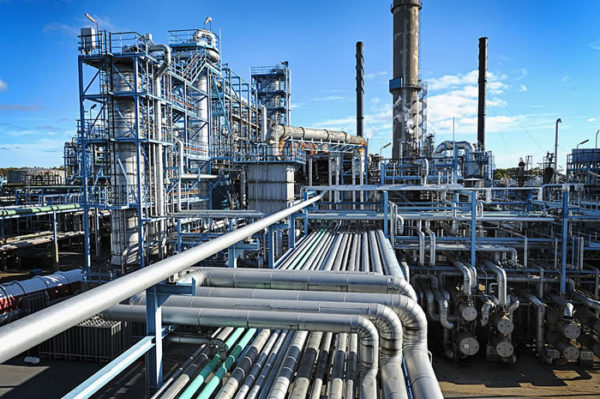 Nigerian refineries are not doing any better than they did in their woeful past despite renewed government pledge to fix them, and that dysfunction, at the root of ongoing fuel scarcity, has worsened in recent months, a PREMIUM TIMES’ analysis has shown.
Nigerian refineries are not doing any better than they did in their woeful past despite renewed government pledge to fix them, and that dysfunction, at the root of ongoing fuel scarcity, has worsened in recent months, a PREMIUM TIMES’ analysis has shown.
The current petrol scarcity, the nation’s worst in years, has marred the 2017 Christmas celebrations and has lasted weeks.
Oil marketers blame the crisis on pricing and the monopoly created by the emergence of the Nigerian National Petroleum Commission as the sole importer and supplier of petroleum products.
But as the crisis lingers, it has again raised the key question about why Africa’s largest oil producer continues to import petrol, and why its four refineries in Port Harcourt, Warri and Kaduna don’t work.
Promise not kept
On assuming power in May 2015, President Muhammadu Buhari pledged to revive Nigeria’s minimally performing refineries to optimum capacity, in what appeared a recap of same promise as contained in the manifestoes of the then opposition All Progressives Congress, APC, during the 2015 electioneering period.
In September 2015, the NNPC in its report said Nigeria’s refineries worked at a combined capacity utilisation of a measly 1.96 per cent.
The report stated further that the combined value of output by the refineries amounted to N9.9 billion for crude processed in September 2016, adding that the associated crude plus freight cost stood at N6.3 billion.
This, the report said, represented a loss of N8.8 billion after an overhead cost of N12.4 billion.
In December 2016, the NNPC promised that the three refineries will work at “full blast” by 2017.
Ndu Ughamadu, the corporation’s spokesperson, said in a statement that NNPC would embark on a comprehensive rehabilitation of the refineries to achieve optimal capacity utilisation.
“The plan for next year (2017) is to get the comprehensive rehabilitation programme done,” Mr. Nghamadu quoted Anibor Kragha, NNPC’S Chief Operating Officer, Refineries, as saying. Mr. Kragha added that the corporation would also draw up a chart for routine Turn Around Maintenance, TAM, of the refineries.
But in September 2017, nine months after the announcement, NNPC’s Group Managing Director, Maikanti Baru, again announced the government’s plan to shut down the refineries for overhaul.
Mr. Baru said the government planned to embark on comprehensive rehabilitation of the refineries in order to bring them to their nameplate production capacities.
He also announced that eight committees had been inaugurated to monitor the exercise, with the mandate to conduct day-to-day check on the work streams.
Poor performing refineries
In December 2015, the NNPC said between January and December of the same year, the three refineries in Kaduna, Port Harcourt and Warri produced 767,490 MT of finished petroleum products out of 1,080,183 MT of crude processed at an average capacity utilisation of 4.88 percent.
Similarly the yield efficiency within the same period under review, the report said, stood at 80.1 per cent.
In July 2017, the NNPC in its report said the combined capacity utilisation of the refineries achieved for the month stood at 11.9 per cent.
It, however, declined to 9.5 per cent in August during which the three refineries produced 95,548MT of finished products and Intermediate product of 53,496MT out of 178,788MT of crude processed.
In its latest report for September 2017, the corporation said the three refineries produced 137,984MT of finished products out of 115,441MT of crude processed at a combined capacity utilisation of 6.14 per cent compared to 9.5 per cent combined capacity utilisation achieved in the month of August.
“The deprived operational performance is attributed to KRPC (Kaduna) and WRPC (Warri) downtime during the month under review,” the report explained.
Operators in the sector say until the nation gets it right with its local refineries, there may be no lasting solution to perennial fuel crises.
In a chat with PREMIUM TIMES on Monday, the national president, Petroleum and Natural Gas Senior Staff Association of Nigeria, PENGASSAN, Francis Johnson, said its members were interested in how the Nigerian government would ensure that the four refineries were made to function optimally.
“If the country’s refineries are functional at full capacity, they would augment what government gets from imports. Consequently, the huge foreign exchange spent on importation of petroleum products and payment of subsidy would be conserved. The refineries would provide jobs for our members and our economy will continue to grow,” he told PREMIUM TIMES.
Some Nigerians have suggested the refineries be sold.
While speaking at an energy conference in Lagos in August, Ibe Kachikwu, minister of state for petroleum, said the Nigerian government was not ready to sell any of its refineries in whole or in part.
He said when the Dangote Petrochemical Refineries is completed in 2019, with its over 600,000 capacity, coupled with modular refineries in operation, Nigeria would be self-sufficient in crude processing.












